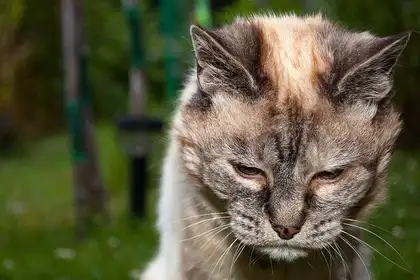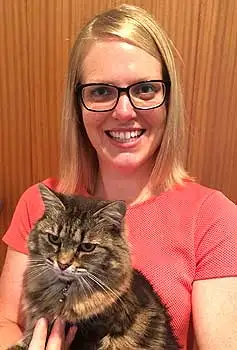
How do we safeguard the welfare of older cats? [Source: Wikimedia Commons].
A Massey researcher is looking for study participants who have euthanased their older cat in the past six months to better understand the interplay between veterinarians, animals and owners around the choice to euthanase.
The research is being undertaken by Ms Kat Littlewood as part of a PhD that aims to safeguard older cat welfare and further inform veterinarians of their role in end-of-life management.
While working as a small animal veterinarian, Ms Littlewood developed some unanswered questions based on her euthanasia experiences, which then developed into a PhD research project.
“When thinking about the death of a beloved cat, often the decision to have it put down seems unfathomable,” she says, but afterwards many of us regret waiting so long and worry about the stress we may have put the animal before the decision was made.
“The central question I aim to answer is: 'what is the veterinarian's role in end-of-life management of older cats in New Zealand?' – once we establish that, we can look at how this can be enhanced,” she says.
“How we manage the end of an animal’s life is important to veterinarians and to me personally. I am focusing on older cats, and cats with a long-term illness because these euthanasia decisions are often much more difficult than when a cat is suddenly injured or becomes very sick quickly. In these sudden situations owners and vets tend to be on the same page about what to do. In contrast, decisions about geriatric cats are more complex and owners may be in favour of allowing the cat to ‘die naturally’ which vets may not agree is the best approach”.
“The purpose of this study is not to criticise the vet for allowing the owner to prolong the animal’s life, nor to criticise the owner for doing so. Rather, the aim is to explore how dialogue might be promoted between the two parties to reach the best possible decision for the animal.”
Ms Littlewood began the research by investigating how euthanasia, end-of-life decision-making, and grief management are currently taught in Australasian veterinary schools.
“In school we are taught to give owners all the information about their pet and let them decide for themselves. We want to see if this strategy is best for the welfare of the animal or if the vet could play a more active role. A great deal of research has been carried out into how we can end an animal’s life in the most humane manner.”
“The more complex and less studied question is how those decisions are made, particularly in terms of the interactions that occur between owner and veterinarian.”

Ms Kat Littlewood
Understanding in tough times
The research will also seek to uncover how the owners of geriatric cats perceive the role their veterinarians have played in the euthanasia process, before comparing this to the veterinarian's own understanding of their involvement.
“This improved understanding of what drives owner behaviour would safeguard older cat welfare and further inform veterinarians of their role in end-of-life management,” Ms Littlewood says. “Importantly, the owner would benefit from knowing that their pet had a 'good' death at the right time, reducing any feelings of guilt or remorse.”
After completing her PhD, Ms Littlewood hopes to continue working in small animal welfare research and teaching.
Cat owners who are interested in participating in the research can visit an online portal that gives them more information about the study and then takes them through a few recruitment questions. This can be accessed here.